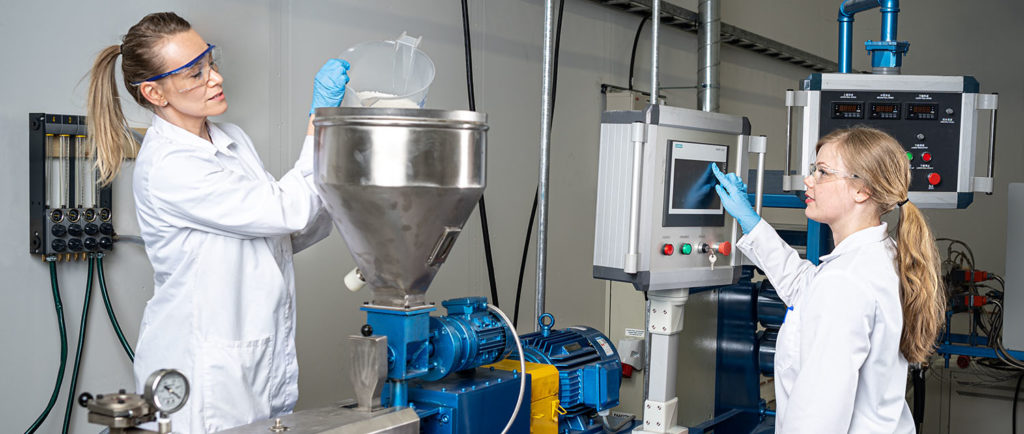Bio-based plastics – Interview with Admir Hadzic, Brightplus
Muovia.com currently offers fossil-based plastics that are primarily manufactured using by-products of the oil refining industry. We are however very interested in bio-based plastics and their evolution. We want to offer our customers a chance to trial bio-based plastics as soon as it is possible. Sustainability is an important value to Muovia.com and our business is based on our urge to use plastic materials until the very last crumb, avoiding unnecessary waste.
Muovia.com currently offers fossil-based plastics that are primarily manufactured using by-products of the oil refining industry. We are however very interested in bio-based plastics and their evolution. We want to offer our customers a chance to trial bio-based plastics as soon as it is possible. Sustainability is an important value to Muovia.com and our business is based on our urge to use plastic materials until the very last crumb, avoiding unnecessary waste.
We met with Admir Hadzic who works as a Senior Chemist at Brightplus Oy. Brightplus is an innovative renewable materials manufacturing company from Finland specializing in the design and development of industrial biomaterial solutions and new functional biopolymers. Bio-based plastics made from these biopolymers can increasingly replace fossil-based plastics in the future.
We interviewed Mr. Hadzic about bio-based plastics, their manufacturing and properties as well as the future prospects of bio-based plastic.

What are bio-based plastics?
Bio-based plastics are plastics that have been either fully or partially made from renewable raw materials, for example from plant-based raw materials such as starch or cellulose. Bio-based plastics can also be called bio-plastics or renewable plastics. It is important to note that being bio-based does not necessarily mean that a material is biodegradable. Bio-based plastics can be either biodegradable or non-biodegradable.
Manufacturing and properties of bio-based plastics
Brightplus is using lactic acid-based polylactide, or PLA, as one of the raw materials to manufacture its bio-based plastics. Polylactide and many other bioplastics are made, for example, from sugar cane, but they can also increasingly be made from a variety of industrial by-products. As a pioneer in the development of biomaterials, Brightplus strives to make the most of untapped material flows in industry and agriculture.

Brightplus creates functional bio-based plastics for example by cross-linking them with different monomers and polymers. The advantage of this method is that the properties of the bioplastics can be modified in desired directions. For example, by letting Brightplus’ patented silicate polymers react with biopolymers, the bioplastic becomes more resistant to UV radiation and high temperatures.
Monomers are small molecules that have the ability to chemically attach to other molecules. The chain of bonded monomers is called a polymer. Polymers occur in nature but can also be prepared chemically. Most polymers are organic which means that they are built around a carbon chain to which organic side groups are attached. By chemically modifying the length of the polymer chain or its side groups, the properties of the material can be changed. The polymer and the bioplastic to which it is added can thus be made softer or harder, more flexible or stiffer, and more resistant to mechanical wear and chemicals.
Products made of bio-based plastics
Bio-based plastics can be made into similar thermoformable plastic granulates as fossil-based plastics. Granulate processing methods include, for example, extrusion and injection molding. Brightplus has manufactured its functional bioplastics for various product requirements. Some examples are a children’s sled made of bioplastic and various packaging. Mr. Hadzic is currently working on the development of bioplastic bottles suitable for use in the cosmetics industry, for example.

At Muovia.com, our most important plastic materials are acrylic and other clear plastics that we sell primarily as sheets. According to Mr. Hadzic, the production of glass clear bio-based plastics is still difficult. Brightplus has manufactured bio-based plastic sheets that can be machined but further product development is still required.
Brightplus continuously strives to enhance the properties of bio-based plastics through their expertise in chemistry and material knowledge so that they can replace fossil-based plastics. Mr. Hadzic believes that the mechanical resistance of bio-based plastics will greatly improve in the near future. At the moment, bio-based plastics are more expensive than fossil-based plastics but with technical development, the costs will level off.
We thank Mr. Hadzic and Brightplus for an interesting discussion and will keep following the development of bio-based plastics.
Sources: Muovipoli.fi

